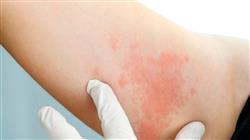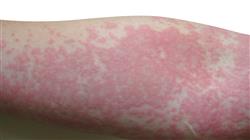University certificate
The world's largest faculty of medicine”
Introduction to the Program
You will intensively delve into allergic, cutaneous, systemic and respiratory manifestations in children's patients, so that you can expand and update your knowledge in a complete and exhaustive way"

The diagnosis of different types of allergies is part of the daily work of many medical specialists, especially in the field of pediatrics. Children come to your offices with various clinical pictures: irritated eyes, respiratory difficulties, atopic dermatitis and in the most severe cases, anaphylaxis, which end up being identified and treated as allergic to dust, dust mites, a certain food, etc. However, there are occasions on which the manifestation of this pathology does not match the specifications of this immune response, in addition to the patient’s inability to communicate what is happening to them. All this may lead to a late or misleading diagnosis.
For this reason, specialists must know in detail and handle the latest scientific advances in terms of protocols for the approach and treatment of these cases, which will allow them to quickly recognize what is happening to the child. Based on this, TECH has considered it necessary to create a qualification that gathers the most current information related to the acute and chronic manifestations of allergic disease in the child and adolescent patient, so that the graduate can get up to date with the most relevant issues in this medical context.
It is a program designed by experts in Pediatrics and Allergology who have created a multidisciplinary and dynamic syllabus, but, above all, adapted to the most demanding requirements of the profession. In addition, its online format and the additional material that you will find in the virtual classroom, give this Postgraduate diploma a high degree of personalization, being able to adapt the educational experience to your own schedule and the degree of knowledge you wish to acquire.
Thanks to this Postgraduate diploma you will be able to get up to date on the factors that influence allergic sensitization and the achievement of tolerance on the triggering cause"
This Postgraduate diploma in Acute and Chronic Manifestations of Allergic Disease in Children contains the most complete and up-to-date scientific program on the market. The most important features include:
- The development of practical cases presented by experts in Pediatrics and Allergology.
- The graphic, schematic, and practical contents with which they are created, provide scientific and practical information on the disciplines that are essential for professional practice.
- Practical exercises where the self-assessment process can be carried out to improve learning
- Its special emphasis on innovative methodologies
- Theoretical lessons, questions to the expert, debate forums on controversial topics, and individual reflection assignments
- Content that is accessible from any fixed or portable device with an Internet connection.
It is 450 hours of the best theoretical, practical and additional material, with which you can get a broad and contextualized view of the latest developments in pediatric allergology in a multidisciplinary manner"
The program’s teaching staff includes professionals from sector who contribute their work experience to this educational program, as well as renowned specialists from leading societies and prestigious universities.
The multimedia content, developed with the latest educational technology, will provide the professional with situated and contextual learning, i.e., a simulated environment that will provide immersive education programmed to learn in real situations.
This program is designed around Problem-Based Learning, whereby the professional must try to solve the different professional practice situations that arise throughout the program. For this purpose, the student will be assisted by an innovative interactive video system created by renowned and experienced experts.
Delve into the most relevant physical examination findings suggestive of atopy will help you hone your diagnostic skills"

Organize your academic calendar in a personalized way and access the virtual classroom whenever and wherever you want"
Why study at TECH?
TECH is the world’s largest online university. With an impressive catalog of more than 14,000 university programs available in 11 languages, it is positioned as a leader in employability, with a 99% job placement rate. In addition, it relies on an enormous faculty of more than 6,000 professors of the highest international renown.

Study at the world's largest online university and guarantee your professional success. The future starts at TECH”
The world’s best online university according to FORBES
The prestigious Forbes magazine, specialized in business and finance, has highlighted TECH as “the world's best online university” This is what they have recently stated in an article in their digital edition in which they echo the success story of this institution, “thanks to the academic offer it provides, the selection of its teaching staff, and an innovative learning method aimed at educating the professionals of the future”
A revolutionary study method, a cutting-edge faculty and a practical focus: the key to TECH's success.
The most complete study plans on the university scene
TECH offers the most complete study plans on the university scene, with syllabuses that cover fundamental concepts and, at the same time, the main scientific advances in their specific scientific areas. In addition, these programs are continuously being updated to guarantee students the academic vanguard and the most in-demand professional skills. In this way, the university's qualifications provide its graduates with a significant advantage to propel their careers to success.
TECH offers the most comprehensive and intensive study plans on the current university scene.
A world-class teaching staff
TECH's teaching staff is made up of more than 6,000 professors with the highest international recognition. Professors, researchers and top executives of multinational companies, including Isaiah Covington, performance coach of the Boston Celtics; Magda Romanska, principal investigator at Harvard MetaLAB; Ignacio Wistumba, chairman of the department of translational molecular pathology at MD Anderson Cancer Center; and D.W. Pine, creative director of TIME magazine, among others.
Internationally renowned experts, specialized in different branches of Health, Technology, Communication and Business, form part of the TECH faculty.
A unique learning method
TECH is the first university to use Relearning in all its programs. It is the best online learning methodology, accredited with international teaching quality certifications, provided by prestigious educational agencies. In addition, this disruptive educational model is complemented with the “Case Method”, thereby setting up a unique online teaching strategy. Innovative teaching resources are also implemented, including detailed videos, infographics and interactive summaries.
TECH combines Relearning and the Case Method in all its university programs to guarantee excellent theoretical and practical learning, studying whenever and wherever you want.
The world's largest online university
TECH is the world’s largest online university. We are the largest educational institution, with the best and widest online educational catalog, one hundred percent online and covering the vast majority of areas of knowledge. We offer a large selection of our own degrees and accredited online undergraduate and postgraduate degrees. In total, more than 14,000 university degrees, in eleven different languages, make us the largest educational largest in the world.
TECH has the world's most extensive catalog of academic and official programs, available in more than 11 languages.
Google Premier Partner
The American technology giant has awarded TECH the Google Google Premier Partner badge. This award, which is only available to 3% of the world's companies, highlights the efficient, flexible and tailored experience that this university provides to students. The recognition as a Google Premier Partner not only accredits the maximum rigor, performance and investment in TECH's digital infrastructures, but also places this university as one of the world's leading technology companies.
Google has positioned TECH in the top 3% of the world's most important technology companies by awarding it its Google Premier Partner badge.
The official online university of the NBA
TECH is the official online university of the NBA. Thanks to our agreement with the biggest league in basketball, we offer our students exclusive university programs, as well as a wide variety of educational resources focused on the business of the league and other areas of the sports industry. Each program is made up of a uniquely designed syllabus and features exceptional guest hosts: professionals with a distinguished sports background who will offer their expertise on the most relevant topics.
TECH has been selected by the NBA, the world's top basketball league, as its official online university.
The top-rated university by its students
Students have positioned TECH as the world's top-rated university on the main review websites, with a highest rating of 4.9 out of 5, obtained from more than 1,000 reviews. These results consolidate TECH as the benchmark university institution at an international level, reflecting the excellence and positive impact of its educational model.” reflecting the excellence and positive impact of its educational model.”
TECH is the world’s top-rated university by its students.
Leaders in employability
TECH has managed to become the leading university in employability. 99% of its students obtain jobs in the academic field they have studied, within one year of completing any of the university's programs. A similar number achieve immediate career enhancement. All this thanks to a study methodology that bases its effectiveness on the acquisition of practical skills, which are absolutely necessary for professional development.
99% of TECH graduates find a job within a year of completing their studies.
Postgraduate Diploma in Acute and Chronic Manifestations of Allergic Disease in Children
Are you looking to be updated on the latest advances in Pediatric Allergic Disease? TEC has the answer! The Postgraduate Diploma in Acute and Chronic Manifestations of Allergic Disease in Children is an excellent option to update you on the latest techniques and treatment protocols in the management of this pathology. This program focuses on understanding the different ways in which allergic disease manifests itself in childhood, as well as the interpretation of diagnostic tests for its correct identification. In this way you will delve into the identification and management of acute and chronic reactions, as well as the prevention and treatment of food allergy.
Get up to date on Childhood Allergic Disease with the comfort and quality you desire
Allergy is one of the most common pathologies in childhood, so early diagnosis and correct treatment are essential to avoid serious complications. This Postgraduate Diploma has a teaching team highly specialized in Pediatrics and Allergology that has developed a complete and updated syllabus, adapted to your needs. In addition, its 100% online mode will give you flexibility in the study adapting to your work and personal life, without sacrificing academic quality.







